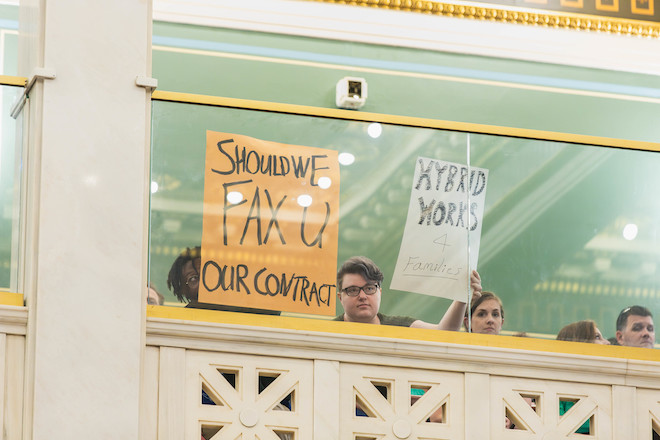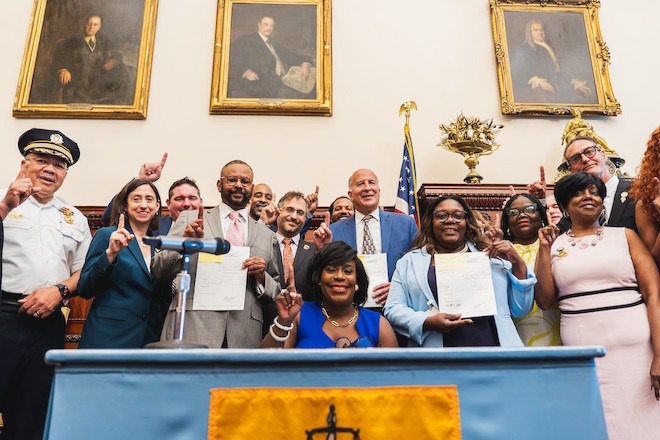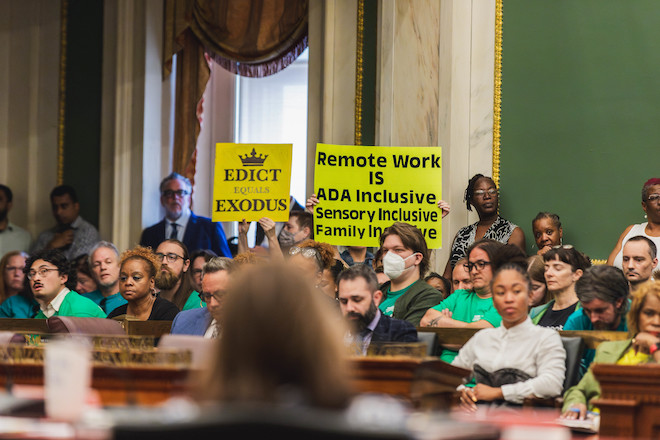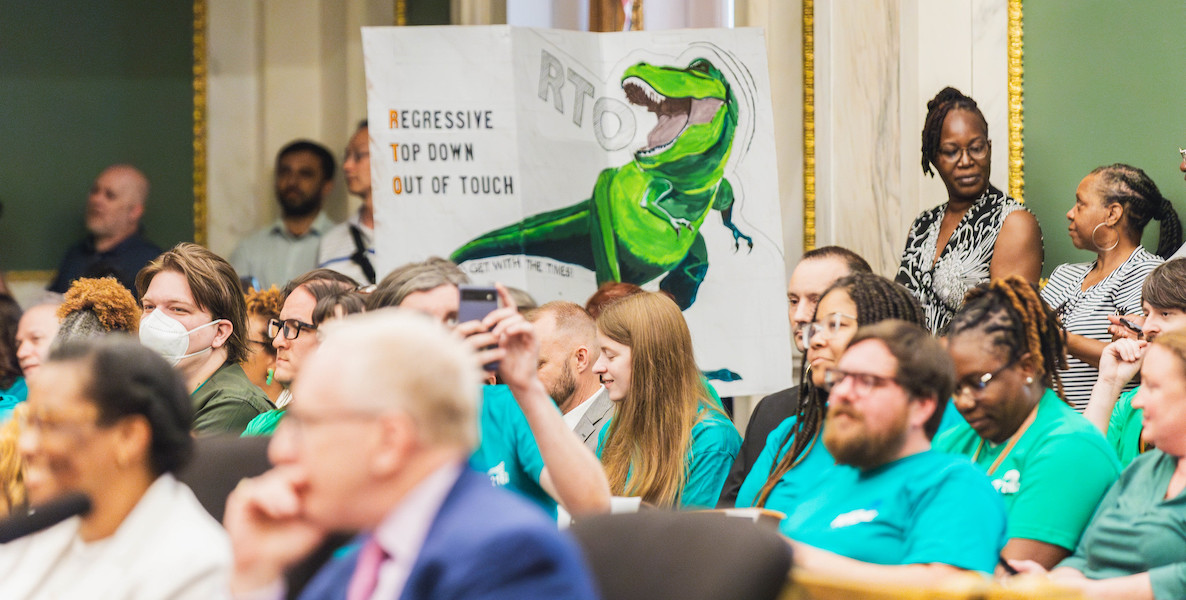Last month, Philadelphia Mayor Cherelle Parker announced that she will be requiring city workers to return to the office (RTO) five days a week as of July 15. The demand is currently the subject of City Council hearings and is being disputed by city workers. But if Parker prevails, she might be one of the first mayors of a major American city to get her workforce back to the office full time.
As I searched for examples of full RTO, I could only find examples of smaller governments, such as Mecklenburg County (6,000 employees) near Charlotte, which goes back to five days a week as of July 1. The mayors of New York City and Washington, D.C. both asked for full RTO and settled for four days a week in office.
The real injustice here isn’t that any employer wants their staff back at work, face-to-face, five days a week. It’s that this demand sets so many Americans up for failure.
While corporate CEOs of companies from UPS to Tesla have pushed for full RTO in recent months, the public sector has remained a largely hybrid workforce. Most city governments are requiring three or four days in office, while some federal departments such as the U.S. Department of Housing and Urban Development only require one day a week in office.
But there is concern that maintaining a hybrid workplace is no longer the appropriate policy for government workforces. Government is a major employer. In Philadelphia, the federal government and the city government are the second and third-largest employers, respectively, and collectively employ more than 50,000 people. A 40 percent reduction in their in-office days has a serious financial impact on the city, as office workers have been shown to spend $51 per day on transportation, lunches out and spontaneous spending in town.
Government’s remote workdays are also depressing public transit ridership recovery levels. In Philadelphia, SEPTA’s ridership recovery remains below national public transit averages at 80 percent of pre-pandemic levels on buses and just 62 percent on the subway.

Finally, government is maintaining leases or ownership of office buildings that are well below their pre-pandemic occupancy, and thus essentially paying for empty office space. This is particularly a problem for the federal government, which spends “about $2 billion a year to operate and maintain federal office buildings regardless of the buildings’ utilization. In addition, agencies spend about $5 billion annually to lease office buildings,” according to the Independent Institute.
A Government Accountability report noted that offices for 17 out of 24 federal agencies are less than 25 percent occupied. Last month Senators Mitt Romney and Joe Manchin proposed the Back to Work Act of 2024 which would require federal workers to telework no more than 40 percent of any pay period, noting that empty federal office buildings waste millions of taxpayer dollars every day.
A “One Philly” message

It’s possible that Mayor Parker is asking for full RTO not just because it’s good for the city’s economy or because she thinks it will make her staff more productive, but because she wants to send a message. Parker believes in signals, symbols and vibes — clearing the drug mecca of Kensington, having a “One Philly” slogan chanted at events, focusing on cleaning streets.
Full RTO fits squarely within that framework. It conveys her seriousness about bringing back downtown and her need for a more engaged employee base. It also feels a bit like an equity play to ask staff back to the office: Why should only white-collar workers get the benefits of remote work?
On the one hand, the full RTO may attract mission-driven younger employees who want in-person workplaces. And the clarity around in-person work expectations can be really, truly helpful in getting staff to be on the same page, doing their best work.
If we want government to be able to attract and retain the best and brightest, they’re going to need to work from a similar playbook as private sector companies.
But most likely requiring five days in office will also cause many solid, hard-working employees who need the flexibility of hybrid work for caregiving to seek employment elsewhere. And it will deprive public employees of one of the benefits their peers often enjoy in the private sector.
According to a recent study about telework by the National Capital Planning Commission:
While agencies seek to attract younger talent, they must adapt to the changing demands of a younger workforce. Notably, since the onset of the pandemic, teleworking and location flexibility have become essential expectations for much of the labor force, especially for younger workers and mid-career professionals … In the modern workforce landscape, teleworking has emerged as a crucial expectation and often a necessity to keep a competitive edge in talent recruitment for younger workers seeking employment opportunities within the federal sector.
In the past, public servants at least got a pension. Today when they’re given performance bonuses, they’re the subject of a New York Times investigation and congressional inquiry. There needs to be a larger conversation about what kind of HR strategies we think governments should have. If we want government to be able to attract and retain the best and brightest, they’re going to need to work from a similar playbook as private sector companies — and they can’t be pilloried for it.
The real injustice

But the real injustice here isn’t that any employer wants their staff back at work, face-to-face, five days a week. It’s that this demand sets so many Americans up for failure.
In other countries like South Korea and France, only 2 to 3 percent of employees work remotely. In their cities, commutes are shorter and more likely to take place on foot, bike or public transit.
To help caregivers balance work and family, Belgium has legislated a four-day work week. In 2021, Lithuania enacted legislation to enable a four-day work week for parents. European countries have found a way to prioritize in-person work, while also acknowledging the need for more personal time for caregiving or other life needs. And this European vision around four days per week in office and an extra day of no work seems like a much better mix than the American default of working all the time, often remotely, without the same core days for everyone.
Calling people back to the office five days a week without addressing these other systemic issues feels unfair because it doesn’t seem to acknowledge this context.
We need a greater realization that the American obsession with remote work stems from a lack of affordable housing near job centers or along quality transit lines, a lack of caregiving supports and, frankly, a cultural devaluation of the importance of being present and in person with others on a regular basis. Calling people back to the office five days a week without addressing these other systemic issues feels unfair because it doesn’t seem to acknowledge this context.
Unlike private sector CEOs who can’t do much to effectuate change in the public realm, government leaders actually are positioned to do more to address the societal problems underlying full RTO. Local and federal leaders can take this moment to gather data and insights into employees’ barriers for full RTO, and then use those grievances, whether about commutes or inadequate time for caregiving to take action on these issues at the local or federal level, rather than push the responsibility for addressing these issues to employees.
This could look like dramatically increasing transit-oriented development to create more housing near city halls or ensuring all public schools have high-quality aftercare options to reduce the burden on caregivers. Employee feedback might lead them to, ironically, institute a four-day workweek trial and see if five days a week in office is that much better for the economy or employee productivity.
Diana Lind is a writer and urban policy specialist. This article was also published as part of her Substack newsletter, The New Urban Order. Sign up for the newsletter here.
![]()
MORE FROM THE NEW URBAN ORDER
Return to office protestors at a June City Council meeting. Photo courtesy of Philadelphia City Council.



